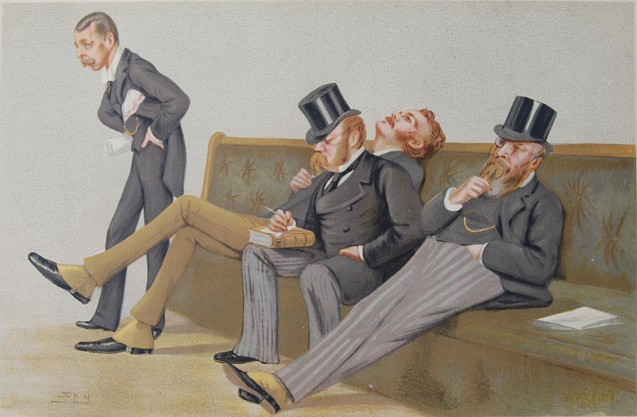Lord Randolph Churchill — Part 2 — A flash in the pan.
 |
| They don’t look like much, but this “fourth party” caused a bit of a stir. (Source) |
You still there? Well, if you are, you might not be after this. It’s time for politics — bear in mind that the man voted as “Greatest Briton”, Winston Churchill, was heavily influenced by his father’s politics and beliefs.
If you stick around, we’ll get to more scandals with Jack the Ripper. I’m dragging this out a bit, aren’t I?
After his graduation in 1870, Randolph first entered the House of Commons in 1874 when he became a Conservative Member of Parliament for Woodstock. His first speech in the House of Commons was said to have grabbed the attention of Benjamin Disraeli, the then Prime Minister. He even wrote to Queen Victoria about Randolph’s “energy and natural flow”.
However, contrary to Wikipedia, it is suggested that his maiden speech made no impression on the Commons. Either way, Queen Victoria seemed unconvinced, as she opposed Randolph’s appointment of Chancellor of the Exchequer in 1886, describing him as “mad”, “odd”, and “disloyal”.
Ol’ Randolph doesn’t seem too bothered about being on the wrong side of the monarchy. In 1876, Randolph was exiled to Ireland after what Wikipedia describes as a farrago with the Prince of Wales, and this was before Randolph suspected him of having an affair with his wife.
 |
| You can see why the Countess was so sought after, can't you? |
Randolph tried to defend his brother by attempting to blackmail the Prince of Wales, threatening to reveal the Prince’s own affair with the Countess of Aylesford. The Prince challenged Randolph to a duel, but Randolph thought better of this by taking exile in Ireland and acting as his father’s private secretary and Viceroy of Ireland.
After the waters had cooled, Randolph returned to England in 1880 during the Liberal, Gladstone’s reign as Prime Minister. Opposing Gladstone as well as noticing weakness and apathy in the Conservative party, Randolph rebelliously led a group of four politicians known as the “forth party”. Randolph also led the charge towards progressive Conservatism or a “Tory Democracy”.
Randolph’s brash style succeeded, and once Lord Salisbury became PM in 1885, Randolph was appointed Secretary of State for India. During which time, Randolph ordered the Third Anglo-Burmese War, thus annexing Myanmar (then known as Burma) — a New Year’s present for Queen Victoria from Randolph.
 |
| To Vicky. Happy New Year. Love Randolph. |
In 1886, Randolph was appointed Chancellor of the Exchequer and Leader of the House of Commons. He had a promising future, but, in December 1886, he threw it all away in a political ploy he thought would work.
Randolph handed in his resignation letter and published it in The Times newspaper in the hopes that Salisbury would agree to Randolph’s budget and rejecting the budget and policies of the War Office.
He might have expected outcry, but he heard… nothing. Randolph remained in Parliament, but never reached the heights of his son.
It was all down hill from there.
More to come.
More to come.



Comments
Post a Comment